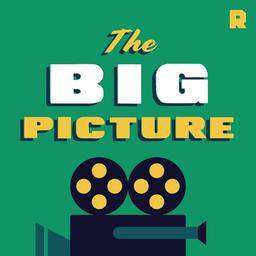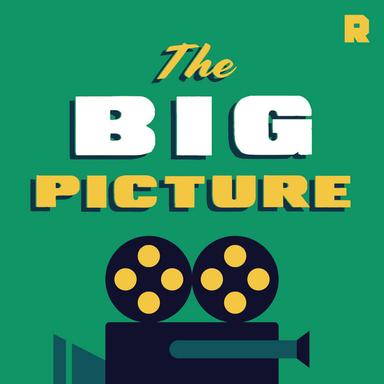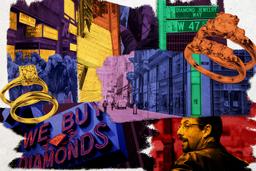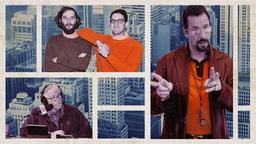Back in January, film critics Manuela Lazic and Adam Nayman began working together on a long list that initially had more than 100 titles on it, in order to sum up something interesting—if not definitive—about the past quarter century of film. Narrowing things down was hard. They spread out their picks as evenly as they could over this 25-year period and also across a variety of styles, and for the rest of 2025, they will be dissecting one movie per month. They’re not writing to convince each other or to have an ongoing Siskel-and-Ebert-style thumb war. Instead, they’re hoping to team up and explore a group of resonant movies. We’re also hoping that you’ll read—and watch—along.
Manuela Lazic: We’ve had such a lovely time so far, writing about beautiful yet wildly different films together. But you never know what life can throw at you. Sometimes, when all seems to be going well, you find yourself having to discuss a movie that many, many people love but that makes you break out in hives. As we see with Howard in the Safdie brothers’ Uncut Gems, accidents happen, and your bets don’t pay off. It’s just bad luck.
Or is it? I can understand why I am here, talking about Uncut Gems as an important recent film. Josh and Benny Safdie are talented filmmakers with a good sense of rhythm and an appealing documentary-like approach to fiction, and this may be their crowning achievement as a filmmaking duo. Uncut Gems follows the series of misfortunes and terrible decisions that a Jewish New York jeweler, played by the ever-ingratiating Adam Sandler, goes through over a few decisive days. A gambling addict and a bit of a dreamer, Howard genuinely loves gems, but also the NBA and money—a bad mix that makes his life a constant tightrope act. Together with revered director of photography Darius Khondji and Daniel Lopatin’s almost omnipresent score, the Safdies accentuate the tension under which Howie is living. The experience of watching this film is a visceral one where each twist of fate that befalls Howie is felt in your bones.
This is partly why I felt like throwing my television out the window when I first saw it. I am not against having a deeply stressful time at the movies—Ari Aster’s masterpiece Beau Is Afraid pushed me out of my comfort zone with its manic and chronically passive protagonist, but I saw it twice and already can’t wait to revisit it—but what irks me about the tension in Uncut Gems is that it feels facile, cruel, and manipulative. To focus on a character so relentlessly and stupidly self-destructive and have the audience share in his frenzy, just for it all to end exactly as you’d expect—this film may look and feel like an audacious shake-up of American indie cinema, but to me, it amounted to little more than empty provocation. I didn’t and still don’t see the point of its irony and braggadocio. Do movies need to “have a point,” you ask? To the extent that the good ones have an internal and sincere coherence and relationship to the world and their audience, yes, I think so. Uncut Gems goes for the jugular but with a smirk on its face; it’s too smart and superior to ever allow its characters to be, dare I say, human, and it doesn’t jostle them around for any purpose beyond being a “crazy” movie.
Again, I want to be clear: I don’t think that movies should always respect their characters—or rather, respecting your characters can mean many different things. Oliver Laxe’s recent Cannes Jury Prize winner Sirât caused a stir for its very shocking twists, and some argued that it didn’t earn the “right” to make its characters go through the ordeals they experienced in the Moroccan desert because it didn’t sufficiently flesh them out. To me, however, the film functioned openly as an allegory and a reflection on film tropes: how movies have taught us to expect certain narrative beats and to resist deviations from those norms. Uncut Gems’ abstraction, by contrast, is only that: an explosion of narrative for the sake of it.
Perhaps there are dimensions to the film that I am not familiar with enough to fully appreciate: the New York landscape, the NBA, the Jewish milieu. Adam, maybe you can shine a light on some of those facets and try your best to prove me wrong on the film at large?
Adam Nayman: I wouldn’t try to prove you wrong, and I think that one test of whether a movie—or its director(s)—is important is how it stands up to principled criticism. Of course, Uncut Gems is not a movie that lacks acclaim: Earlier this year, it ranked 58th on The New York Times’ list of the best films of the 21st century so far, and it has already been canonized by the Criterion Collection. It’s also one of the most commercially successful films in the history of A24. But as much as I enjoy it, I think that there’s a case to be made that the fanatical ratcheting of tension in the film’s story—and the extent to which Howie is written and acted as a pathologically self-destructive character—has a certain theater-of-cruelty quality worth flagging. The potential skepticism about Uncut Gems and its exultant descent into the lower depths is not in spite of the filmmakers’ skill but because of it. The title of the brothers’ previous movie might be instructive here: Is it possible to immerse oneself in such insanely bad vibes and still have a Good Time?
The one item on your list of things that you possibly feel less connected to than me—the role that NBA basketball and its history and mythology plays in the world of Uncut Gems—is worth talking about, I think, and not just because I’m a fan (or because the intersection of gritty, avant-genre realism and hoops mania makes the film the platonic ideal of a Ringer conversation piece). When I talked to the Safdies a few years ago, they discussed how the script for Uncut Gems kept changing based on which real-life basketball players were attached; the eventual casting of Kevin Garnett was the best thing that ever happened to the movie since he’s basically an avatar for the kind of obsessive competitiveness that can metastasize into uncanny box scores and outcomes. When KG had it going in his prime, Anything Was Possible, and the magic-realist enigma at the edges of the story—whether Garnett’s exposure to the opal inspires his world-beating on-court performance—hinges on his charisma and intensity.
One of my favourite Safdie films is their 2013 documentary, Lenny Cooke, about a real-life basketball prodigy whose career didn’t turn out the way he—or the various members of his family and entourage—expected, and whom the brothers treat with a special combination of directness and empathy. On the one hand, Cooke was a better basketball player in his teens than probably 99.9 percent of his peers. An awe-inspiring figure. On the other, circumstances (some beyond his control, some within it) led to him coming short of his potential, and it’s this sense of duality—that it’s possible to be a winner and a loser simultaneously, whether you’re an athlete or a gambler trying to live vicariously through their exploits—that thrums at the heart of Uncut Gems, which may be all the things you say it is but still strikes me as being fundamentally humane.
Or maybe it’s just that I can’t help but see humanity in Sandler, a genuinely great seriocomic actor whose collaboration with the Safdies is mostly perspiration—you can feel the flop sweat emanating from Howie’s pores—with some aspiration thrown in. Since signing his landmark deal with Netflix in 2014, the Sandman has been churning out movies at a rate commensurate with their general half-assedness. The vast majority of recent Happy Madison productions aren’t very good, although it doesn’t really matter. There’s a whole conversation to be had about the laid-back, victory-lapping metaphysics of a movie like Happy Gilmore 2—which I liked, by the way, and even found moving in places—but my point is that every so often, Sandler seeks out a chance to flex his very real talents. The first time this happened, on Punch-Drunk Love, he was widely (although not unanimously) praised for acting outside the box—which is ironic because in many ways Punch-Drunk Love is a standard-issue Adam Sandler movie, a story about a rage-a-holic who stands up for himself and gets the girl. What he’s doing in Uncut Gems is similar insofar as Howie is also a walking alienation effect, but this time in a movie that isn’t fundamentally on his side. If Punch-Drunk Love is a movie about a bruised character seeking to be healed, Uncut Gems suggests that Howie’s irrational yearning—a familiar trope of guy-on-tilt movies, including Karel Reisz’s The Gambler, which looms large in the Safdies’ pantheon—places him beyond conventional salvation, and the movie follows that logic to its morbid (and ecstatic) conclusion.
It’s funny because there’s another significant American movie from the last decade and a half that begins with its married, middle-aged Jewish protagonist in the midst of a medical examination, that has a plot hinging on the archetype of the hustling, existentially besieged money-mover, and that has been acclaimed and disparaged in equal measure for being too quote, unquote mean to its characters. I’m talking, of course, about Joel and Ethan Coen’s A Serious Man—a movie that I know you love and that also arguably wears a smirk on its face. I’m inherently sympathetic to the Coens’ recidivist shtick and the way they send their characters on fruitless loop-de-loop searches for meaning; I can reconcile the anxious, ambient misanthropy of A Serious Man under the sign of auteurism. Is your issue with Uncut Gems singular to the film, or do you have problems with the Safdies’ work in general? Do you like Daddy Longlegs, the movie of theirs that I think is closest to Uncut Gems?
Lazic: I just watched Daddy Longlegs for this conversation, and I did like it a lot more than the other Safdie films I’ve seen (I’m still missing Lenny Cooke and The Pleasure of Being Robbed) because it has much more heart while still focusing on an imperfect, irresponsible man making life difficult for everyone around him. This probably has a lot to do with the fact that the main protagonist, Lenny (Ronald Bronstein, who cowrote this and other Safdie films, including Uncut Gems), is based on the Safdies’ father and that the film is a representation and interpretation of their complicated childhood as kids of divorced parents. There’s also more room in that movie for the character’s self-doubt and intelligence: Although he makes horribly misguided decisions, he isn’t a complete fool, and the film appreciates that—it respects him to some extent. It also doesn’t just make fun of his happy-go-lucky attitude but rather highlights when it is a positive trait, whereas it’s hard to watch Howie in Uncut Gems and not find him unbearably childish pretty much all of the time.
I’m not sure that auteurism is what makes me more accepting of the Coens and their method of sending their characters on humbling journeys without satisfying conclusions. In A Serious Man, which indeed I adore, the filmmakers enjoy pushing their characters’ limits but also take their distress seriously; they don’t place themselves above them. They also don’t know what was written on the goy’s teeth! They use their films to work out their own questions about the meaning of life and the function of narrative; they laugh at themselves when they laugh at their protagonists, which in turn allows the audience to do the same. Uncut Gems feels voyeuristic, and like it’s mocking Howie simply because he’s an idiot. It could be a fun exercise to imagine a Coen bros. version of the film—they might manage to make it even more excruciating to watch because they would find a way to infuse some human feeling into it without necessarily making the protagonist smarter (see: Brad Pitt in Burn After Reading). They might try to connect to him and make his delusions of grandeur something to laugh at but also to relate to. They wouldn’t lose the irony of the story, but they may locate it in the world, rather than in Howie’s stubborn refusal of logic. In brief, there would be a greater and more coherent sense of the uncertainty principle.
It’s probably safe to assume that the Safdies are indebted to the work of John Cassavetes when it comes to working with actors: Their fellow New Yorker knew how to capture the most truthful, unvarnished performances possible, and many of the Safdies’ casts feature that quality of unglamorous nakedness. As you mentioned, Sandler can be brilliant when his nonchalance is harnessed; in Punch-Drunk Love, Paul Thomas Anderson managed to first contain it within an oppressive, controlled environment, only for it to better explode and shine when love arrives and gives Barry the courage to break loose. Uncut Gems lets Sandler lean even further into his limpness and beatitude—he is himself a kind of uncut gem, a raw diamond with sharp corners, and I love him in this film, too. The secondary characters help give shape to Howie’s life: Since he keeps acting as though he owes nothing to no one, even his closest friends become obstacles to his will. The actors playing those parts have to match or counter his energy, and they do. Eric Bogosian’s restraint tinged with bafflement throughout the film is both hilarious and admirable, a much smarter choice than going ballistic every time Arno sees Howie. Julia Fox is a natural talent with incredible charisma and a great sense of comic timing, so much so that she manages to make her scenes with the Weeknd credible. That said, her part isn’t exactly a great one; the Safdies haven’t shown real interest in female characters as more than objects of affection or rejection for their male counterparts. Fox’s potential spills over the film, which is a real shame. After all, her “Uncut Jahms” is iconic in a way that the film is not.
Nayman: Fox is iconic, and Uncut Gems has surely inflected her choice of roles and public persona; she couldn’t get away from it even if she tried. The Julia character is one of several elements in the movie where the Safdies are playing with fire—the flinty mistress with a heart of gold is a screwball cliché that can lapse into simple misogyny, and some of the criticisms of Anora (a movie very much under the sign of Uncut Gems) and the way Sean Baker conflates empathy with exploitation apply here as well.
Everywhere you look, Uncut Gems is playing (recklessly, dextrously, clumsily) with sexual, racial, and ethnic stereotypes; the long set piece in which Howie seethes over Julia going into a private room with the Weeknd prods the character’s paranoia and hypocrisy while exploding the theme of Black-Jewish solidarity at the story’s center. Howie’s envy of his Black clientele—and his need to be taken seriously as a winner on his own off-court terms—is not necessarily endearing, but it feels authentic all the same.
There is one exception to the Safdies’ focus on and ambivalent affection for shady male fuckups, and that’s Arielle Holmes as Harley Boggs in Heaven Knows What—for my money the most harrowing of the Safdies’ films and the one whose methodology drags plenty of viewers (including me) into a kind of discomfort zone. The movie is based on Holmes’s then-unpublished memoir about living rough and scoring heroin in Chinatown and the Diamond District; the story goes that Josh Safdie noticed her while scouting locations for Uncut Gems—a project that took a decade to realize—and encouraged her to shape her life story as a screenplay. (Fox was cast in Uncut Gems in much the same way.) The backstory that Holmes was a homeless, recovering addict during production was taken by critics and journalists as a guarantee of the film’s authenticity. “All I wanted to do with this movie,” Josh told Vulture, “is shed some light or shed some truth on what this lifestyle actually looks like.” In interviews, Holmes frequently talked about how much she enjoyed working on the movie and how cathartic it was to have her experiences dramatized, not least of all because she was given the chance to play herself; her own performance is raw and unsentimental in a way that stars like Sandler or Robert Pattinson, for all their skill, simply could not approximate. I might want to wring Howie’s neck from scene to scene or wish that he would quit while he’s ahead, but I’m not worried about Sandler; with Holmes, there was something else at stake.
The line between truth and sensationalism—and collaboration and exploitation—is thin and permeable. If I happen to think that Heaven Knows What is a powerful and beguiling movie, it’s also one whose context gives me pause. It doesn’t feel entirely safe, and the question of whether the shift away from complex subjects like Cooke and Holmes and toward actors like Pattinson and Sandler—A-listers slumming it with aplomb—means that something vital has been lost in the Safdies’ work is worth asking.
It’s also worth asking how much the reports about sexual misconduct committed by Uncut Gems producer and Elara Studios cofounder Sebastian Bear-McClard—and his subsequent termination by the Safdies—had to do with the brothers’ much-publicized creative split. In 2023, Benny talked about trying to “take control” of a situation that placed Uncut Gems’ success in an unflattering light. I don’t pretend to have any insight into the situation beyond what I’ve read, yet it’s telling that both Safdies seem to be moving (on separate but parallel trajectories) away from the gritty insularity that defined their early work, toward big-budget, high-profile prestige productions. Not “selling out,” perhaps, but leveling up in ways that also require a less mysterious or ambiguous process.
I can’t compare The Smashing Machine to Marty Supreme because I haven’t seen the latter; certainly Benny’s profile of the flawed, drug-addled MMA fighter Mark Kerr feels of a piece with films like Lenny Cooke and Heaven Knows What, while Marty Supreme’s story of a hard-driving ping-pong player potentially checks some similar thematic boxes. What’s interesting is how in just over five years, Uncut Gems has gone from seeming like a simultaneous culmination and refinement of the Safdies’ aesthetic to a prematurely valedictory work that both directors will be hard-pressed to live up to, whether separately or together. Frankly, they might not want to try.







